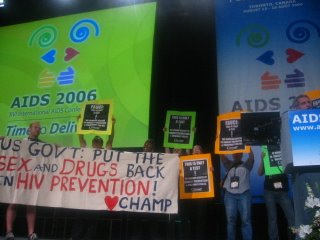 It's been a decade since I attended my one and only Int'l AIDS Conference when it took place in Vancouver, Canada, in 1996. Back then, Colombian activist Jairo Pedraza (to whom I pretty much owe my career in LGBT activism), Puerto Rican activists Luis "Popo" Santiago and Carlos Maldonado (who remains a co-worker of mine ten years later), and I, organized what was probably the first international symposium on access to HIV treatments in Latin America, drawing some of the luminaries in HIV/AIDS prevention and treatment including Clinton White House HIV Policy Director Sandra Thurman and UNAIDS Executive Director Peter Piot (as well as a smattering of activists from Latin America who were able to either get scholarships or pay their way to Canada).
It's been a decade since I attended my one and only Int'l AIDS Conference when it took place in Vancouver, Canada, in 1996. Back then, Colombian activist Jairo Pedraza (to whom I pretty much owe my career in LGBT activism), Puerto Rican activists Luis "Popo" Santiago and Carlos Maldonado (who remains a co-worker of mine ten years later), and I, organized what was probably the first international symposium on access to HIV treatments in Latin America, drawing some of the luminaries in HIV/AIDS prevention and treatment including Clinton White House HIV Policy Director Sandra Thurman and UNAIDS Executive Director Peter Piot (as well as a smattering of activists from Latin America who were able to either get scholarships or pay their way to Canada).Those were heady days and showed me the potential of activism on an international scale. I was idealistic and full of rage that people with HIV throughout Latin America would have to sit back while those in first world nations were seeing the tremendous impact of the first wave of anti-retroviral medicines in prolonging life. But what still sticks with me was the overwhelming sense of sadness that took over me at seeing so many thousands of activists from around the world congregate in one place to demand and scream for treatment for people back in their home nations while millions were obviously spent in extravagant conference pavilion set-ups by pharmaceutical companies, some to peddle pills that eventually proved too toxic or had terrible and hidden side-effects. I will never forget the seemingly insurmountable divide between pharmaceutical greed and human necessity that I saw represented in Vancouver.
For all I know, that divide is still alive at these events but, overall, it's indisputable that some things have improved in the last decade and that more people around the world have access to treatment.
Strikingly the talk of the town this year was apparently prevention after years of the focus being on treatment. After years in this field, I've come to see these shifts in focus as being cyclical when all along the focus should be on BOTH prevention and treatment (some would ad a third: Finding a cure) but talk of a new focus on prevention feels tremendously hopeful. Who knows, down the line, it might mean that we can expand on stuff like this both locally and internationally.
Another key difference ten years later is the relative lack of media attention given to this year's conference at least here in the United States. Not that there wasn't any reporting, just that what would have been in the front page ten years ago now seems to be relegated to the back-pages (a common thread for a society that seems to have bought into the false fact that AIDS is now a manageable illness).
Now, even if you missed some of the developments at this years conference, I urge you to go to TimeToDeliver.com for an "independent, uncensored" look at what took place there from the vantage-point of AIDS activist bloggers. Had I gone to Vancouver this year, I would have joined them in writing for the site but that will probably have to wait until 2008 when the next conference takes place, for the first time ever, in a Latin American country: Mexico will be the host country and I can already feel chills up my spine thinking of what it may bring to the region in terms of increased attention, resources and hope to address HIV/AIDS in the region.
The Henry J. Kaiser Family Foundation also has a fine site on this year's conference here.















1 comment:
This conference was my first...and while the rage may no longer be the same as when you attended back in 96, I still had to visit the prayer room occasionally during the day to collect myself..it was just too many people there...and for what??? HIV and AIDS...
hopefully I'll see you in 08!
Post a Comment